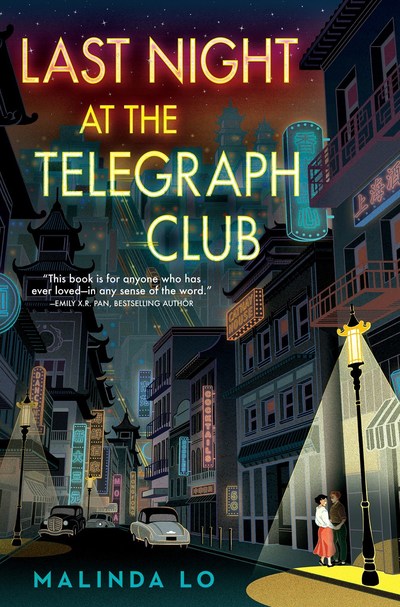San Francisco’s Chinatown in the mid-1950s contains two worlds folded into one another: Its tightknit community looks out for its own interests, but many of its businesses serve white tourists in search of a particular experience that the community feels obligated to deliver. At 17, Lily Hu is also living two lives. A good student and obedient daughter, she knows she likes girls and has begun to fall for her new friend, Kath. She also knows she can’t be open about their relationship, but the gay nightclub she’s been sneaking out to—full of white faces and casual racism—is hardly a safe haven either. Malinda Lo’s Last Night at the Telegraph Club is a work of historical fiction that’s as meticulously researched as it is full of raw, authentic emotion.
The book is divided into sections, with timelines that highlight historical events and situate the lives of Lily’s family members among them. Senator McCarthy’s antagonism toward Communism has made neighbors afraid of one another, and his movement also targets people who are gay and lesbian. If Lily and Kath’s relationship is discovered, the consequences for Lily’s family will be disastrous. Lily’s parents’ own stories are complicated and full of difficult choices, and they want their daughter to choose the easier path that their sacrifices have made possible. But Lily is a protagonist to be reckoned with. Her aunt’s work at NASA’s Jet Propulsion Laboratory sparks her fascination with space exploration. When her relationship with Kath leads to heartbreaking consequences, Lily is steadfast and faces them head-on.
Lo’s writing is packed with sensory details; her descriptions of midcentury San Francisco are gorgeous, and she vividly brings its lesbian subculture to life. Among these excellent details are the pulp novels Lily reads, which allowed queer people to see themselves on the page (though such representations always ended in suffering), as well as popular music that revealed how gender could be a playground, even in a period with rigid masculine and feminine roles.
Shout it from the highest hills: This is a beautiful, brave story, and Lily is a heroine that readers will love.




